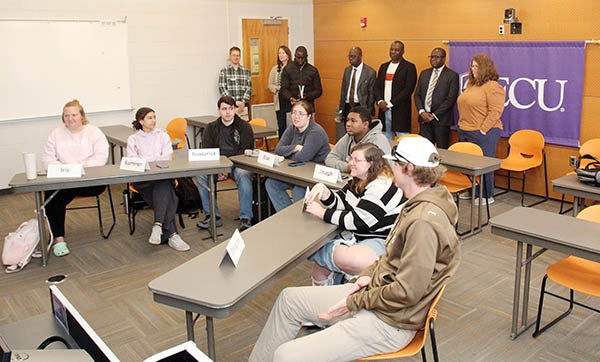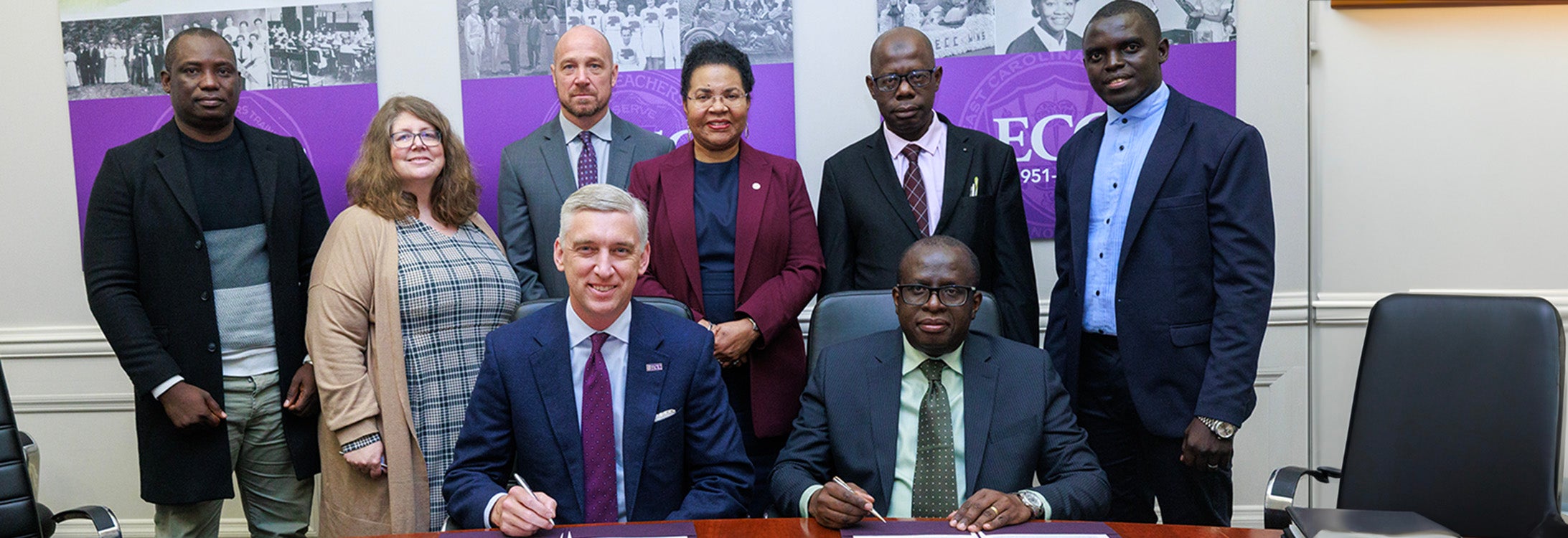ECU partners with University of The Gambia for intercultural exchange
A partnership between East Carolina University and the University of The Gambia will allow ideas and support to flow freely between two institutions 4,000 miles apart.
A delegation from the University of The Gambia visited ECU March 26-28, when they met with campus leaders, visited classes and toured campus. During the visit, ECU Chancellor Dr. Philip Rogers delegated Provost Dr. Robin Coger to sign a memorandum of understanding with University of The Gambia Vice Chancellor Dr. Herbert Robinson on March 28.
“We are excited to partner with the University of The Gambia,” said Rogers. “There are many ways that our students, faculty and staff will benefit, and we look forward to working with Vice Chancellor Robinson on intercultural exchange as well as exploring innovative ways to solve common challenges.”

Representatives from the University of The Gambia stand and observe a class in which ECU students collaborate with university students in Poland. (Photo by Ken Buday)
“We are extremely delighted as a delegation to be here,” said Robinson. “Over the years the University of The Gambia has been an active participant but we are looking to see how to deepen the partnership. We know it benefits our students significantly and look forward to providing more students the opportunity for intercultural exchange.”
Established in 1999, the University of The Gambia has 7,500 students enrolled in nine schools. Similar programs to ECU include schools of arts and sciences, education, engineering and architecture, medicine and allied health sciences.
Dr. Jami Leibowitz manages the Global Partners in Education, a membership organization of universities including ECU and over 50 institutions that participate in international virtual exchange. The University of The Gambia is one of these institutions.
“We have relationships with universities in over 30 countries worldwide,” said Leibowitz. “We are the ones who designed the program, and the participating universities all work with us and each other.”
The institutions first collaborated in 2005 when Robin Yeager, then the public affairs officer at the U.S. Embassy in Banjul, Gambia, heard a presentation by Dr. Rosina Chia and Dr. Elmer Poe on what has developed into ECU’s global understanding course program. Yeager helped the University of The Gambia adopt the global understanding courses and acquire the necessary technology needed to implement a virtual program. Both professors visited the university before the first class.
Other collaborations between the schools included the awarding of the Poe Award for Excellence in Technology Support in 2011 to Psara Drammeh, a technology support assistant for the University of The Gambia. In 2018, ECU was awarded an undergraduate international studies and foreign languages program grant from the Department of Education to build four new virtual exchange courses in global business, global education, global environment and global health. The University of The Gambia had planned to implement the global health course, but was unable due to COVID-19 and staff changes.
As one of ECU’s global partners in education, the University of The Gambia has participated in ECU’s global understanding class nearly every semester as well as global environment and global business classes.
Of the ECU students who take global understanding classes, nearly 25% are freshmen. The classes are taught in multiple departments as they are based on a method of teaching instead of a particular topic.
The main area that the University of The Gambia utilizes support from ECU is through technology support, explained Leibowitz.
“University of The Gambia is a growing university,” said Leibowitz. “They’re looking to us on how to manage a larger university. They’ve asked us questions about how to integrate software programs and are trying to figure out how to manage all of these systems as they grow. At the same time, they’re looking at how to encourage more research and also manage the facilities of a growing campus.”
Partnering with the University of The Gambia allows ECU to increase awareness about an area that may not be well known to most students.
“Any opportunity to expose our students and staff to new cultures, especially to ones that are less familiar, is a wonderful one,” said Leibowitz. “Awareness of sub-Saharan Africa is something that is sorely missing in America, but there is so much innovation and opportunity in terms of people that is untapped.”
Liebowitz is also optimistic about the possibility of faculty exchanges to the campus in Sera Kunda on Africa’s west coast. Student exchanges may be a bit more challenging.
“ECU would love to have student exchanges, but the reality is that likely won’t happen,” said Liebowitz. “This is due to a lack of interest in our students to go there for a semester as well as an inability to have balanced exchanges. Coming to ECU is extremely expensive for them. I hope that we may be able to establish more faculty and staff exchanges where we can send and bring faculty back and forth for a short period.”
Staff exchanges and collaborative research projects are areas that Robinson feels could be beneficial for his university.
“We are looking at the opportunity to collaborate with staff research projections,” said Robinson. “Our delegation found that we have similar problems with flooding and water salinity. I believe our faculty would be energized by a collaboration with the Department of Geography, Planning and Environment and Water Resources Center and that it would be fruitful.”
Some of the beneficiaries of the partnership could be ECU medical students who can gain experience working with a diverse patient mix.
“A big focus particularly in health is cultural competence and being able to deal with diverse patients and practitioners,” said Liebowitz. “Bringing those other perspectives and experiences is always important. For any of our students who want to do mission work or work elsewhere, having familiarity with these types of settings is important.”
While meeting with ECU representatives from the Brody School of Medicine as well as the College of Allied Health Sciences, Robinson and the University of The Gambia delegation discussed the potential of a staff and student exchange and shared ideas on how to solve problems that both universities face.
“We discussed a staff exchange with those who are interested in tropical medicine,” said Robinson. “Many of the students in the medical school would benefit from this sort of specialization. We were also able to learn how the medical degree program is delivered, and it was interesting to hear that we face some of the same challenges when trying to ensure students gain clinical experience.”
During their tour of campus, Robinson and the University of The Gambia delegation visited the College of Fine Arts and Communication and saw a display of African art from several countries. If he has his way, the display will soon have an addition.
“We’re excited about the possibility that we can have art from Gambia included as part of the display,” said Robinson. “We learned a lot from our visit and are excited about the opportunities ahead.”
